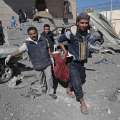Stop the killing in Yemen
YemenExtra
By:Ambassador Daniel Speckhard
Horrific images of starving children are emerging from Yemen, echoing the Ethiopian famine that galvanized world attention. They are finally shining a light on what is being recognized as the world’s worst humanitarian disaster.
But Yemen has yet to inspire a similar global outcry and mobilization, reflected in the charity supergroup Band Aid and its song, “Do They Know It’s Christmas?” Perhaps our ambivalence has something to do with our involvement in Yemen’s civil war.
Like many of the world’s crises, the cause of the suffering in Yemen is armed conflict. A Saudi-led coalition, with material support from the U.S., has conducted an indiscriminate bombing campaign that has destroyed public infrastructure and claimed thousands of civilian lives. The misery caused by the chaos on the ground has triggered an epidemic of cholera that has sickened nearly 1 million people. And a protracted Saudi blockade of Yemeni ports of entry, which has only been partially lifted despite pressure from the Trump Administration, has prevented life-saving aid from reaching the war’s victims.
Given U.S. military support to Saudi Arabia, we need to recognize we share some responsibility for this crisis. And our involvement risks not just moral authority but also strategic miscalculation, as the fighting in Yemen is seen as a proxy for a confrontation between Saudi Arabia and Iran.
Unable to ignore the humanitarian catastrophe any longer, the U.S. House of Representatives recently passed a resolution calling on all parties to take measures to prevent civilian casualties and allow humanitarian access. While the sense of Congress resolution is non-binding, it may have been helpful in getting to the Saudis to announce the easing of the blockade of Yemen that had prevented humanitarian supplies from reaching the country.
However, the resolution does nothing to stop American support for the war, including providing weapons and targeting information, as well as refueling warplanes, for Saudi Arabia and other allies, whose bombings have killed innocent civilians, destroyed much of the public infrastructure, and compounded the expanding health crisis.
As the leader of a faith-based humanitarian organization, I am compelled to speak out on behalf of the innocent and most vulnerable caught in the crossfire of war. At the same time, my decades of service as a U.S. diplomat also cause me to question whether our U.S. national security interests are being advanced by aligning ourselves with a party to this conflict.
From my time as deputy ambassador to Iraq, I know the profoundly destabilizing effect of humanitarian crises on societies in need of peace and reconciliation. They can have a catalytic effect on terrorism. Our close alignment and military support for the Saudi bombings and military effort in Yemen may actually be undermining U.S. security. Images of the hundreds of women and children killed, and the photos of starving children affected by willful blocking of humanitarian aid, will be used to recruit a new class of extremists willing to target American civilians in perceived retaliation.
Even worse, we may be inadvertently helping to arm al Qaeda as the group is reportedly aligning itself with Saudi-backed Sunni tribes in Yemen fighting the local Iranian-backed Shiite Houthis. They may be indirectly acquiring a wide range of new weaponry, including heavy weapons from Yemeni military camps or acquired indirectly from the Saudi-led coalition. Moreover, according to reporting from Foreign Policy, a U.N. Security Council panel of experts determined that the Saudi Arabia-led coalition’s strategic air campaign continues to have little operational or tactical impact on the ground, and is only serving to stiffen resistance.
With little to show on the military front and a human catastrophe of historic proportions unfolding, it is time for the United States to fundamentally reexamine its policy toward Yemen. While the current strategy may allow Saudi Arabia to eventually recapture Sana’a and place a friendly strongman in power, this won’t be achieved without thousands more deaths of innocent civilians and a further erosion of the U.S. moral authority and leadership in the world.
The article expresses the author’s opinion and does not represent the site’s policy.

